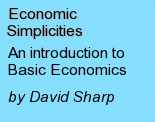




INTRODUCTION TO ECONOMICS
Lesson 1 given at Alia College (Melbourne)
WHAT IS ECONOMICS?
1 Economics is a part of knowledge; a discipline or systematic field of study. It is a social science, i.e. one of a number of sciences concerned with the study of humans acting in a group, such as anthropology, politics and history. However the primary question is
WHAT IS THE SUBJECT MATTER OF ECONOMICS?
2 Determining precisely the subject matter of Economics has proved extremely difficult in the past and even today is the subject matter of great debate. There is no single or universally accepted
definition of what it comprises since various schools and individual economists continue to argue over its ambits and aims although there is general agreement in core areas. This has led there being a number of different definitions of Economics.
DEFINITION
3. Some definitions include
[a] The study of how to found a household and how to make use of it.{Aristotle]
[b] The study of how people provide a subsistence for themselves and revenue for the
State.[Adam Smith]
[c] The science of wealth and value.
[d] The social science that deals with economic goods.
[e] The study of production, consumption, value, distribution and exchange
[f] The study of how societies use scarce resources to produce valuable commodities and
distribute them among different people.[Paul Samuelson]
[g] The study of the application of scarce resources to competing ends.
[h] The study of purposive human action.[Ludwig von Mises]
The main difference in definitions arises between those who focus on certain goals and objects of inquiry such as wealth, production and exchange as being the distinctive feature of Economics
and those who claim that it is rather the process of analysis or the method of thinking about goals or objects that itself is the defining characteristic. Effectively according to this view virtually anything is capable of being looked at economically. The development of the science of Economics is reflected in its history.
SOME HISTORICAL ASPECTS
4. The first inquiries into what may be regarded as Economics concerned human subsistence and the supply of income to rulers. By the 17th century a doctrine of thought known as Mercantilism had developed. Mercantilism regarded national self-sufficiency as of primary importance and that amassing money, ie gold and silver, was the secret of a nation’s success. In 1776 Adam Smith published the first great Economics text, The Wealth of Nations, which among other things exposed the fallacies of Mercantilism and ushered in an age of market economics. Throughout the 19th century the Classical economists including Ricardo, Malthus and J.S. Mill held sway although perhaps the most influential text of this time was Karl Marx’s Das Kapital, the genesis of the Marxist School.. Following the onset of the Great Depression in 1929 the most famous economist of the 20th century, John Maynard Keynes, published his text, the General Theory of Employment Interest and Money which established Keynesianism, despite significant criticism from various sources , as the dominant school in Economics for the rest of the century. One reason that Keynesianism has been taken up with enthusiasm world-wide is the dominant role that it ascribes to the role of government, which is an aspect many governments welcome. Keynesianism has in effect created Macro-economics or National Accounting which postulates that economics as it applies to nations is fundamentally different to that which applies to companies and individuals. This concept has been much criticised in recent years, particularly by the Austrian school, as the world has faced the possibility of another major depression.
WHY STUDY ECONOMICS?
5 It is possible to be knowledgeable and well educated without studying Economics but one who wishes to participate in public affairs, or even more so, to take part in the creation of public policy, without having done so is likely to be regarded as a babbler.
WHAT TO EXPECT?
6. VCE and University economics courses continue to be dominated by Keynesianism. The major part of the first few years of study will therefore betaken up with Macro-economics and the study of the compilation and use of such aggregates as Gross National Product, the Balance of Trade and so forth. Most people find this difficult or boring or both. However if one persists one is likely over time to find easier and more interesting aspects will occur and one will be exposed to many fundamental questions and topics and might even begin to acquire some answers and understanding. These include such things as
[a] What is scarcity?
[b] What is money and what is its use?
[c] What is the law of comparative advantage?
[d] Is competition beneficial or harmful?
[e] Can unions raise real wages?
[f] What is the effect of rent control or price control?
[g] What is or was the Industrial Revolution and how did it occur?
[h] What is inflation and how does it occur?
[I] When was the Great Depression and how did it occur?
[j] What is a poll tax, a progressive tax, a flat tax? What is the effect of each?
David Sharp
10 September 2001